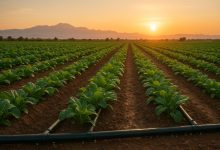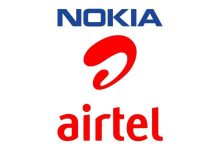Top 7 Solar Irrigation Startups in Africa

Africa’s agricultural sector faces significant challenges, with less than 4% of its farmland irrigated and $2 billion spent annually on diesel-powered pumps. Solar-powered irrigation offers a cleaner, cost-effective alternative, reducing farmers’ energy expenses by up to 80% and increasing crop yields. Startups across Africa are driving this shift by providing affordable, locally designed solar solutions. Here’s a look at seven leading companies transforming irrigation:
- SunCulture: Kenya-based, with over 45,000 systems sold, offering “pay-as-you-grow” financing.
- M-KOPA: Known for its pay-as-you-go model, expanding solar irrigation across East Africa.
- WeLight: Focuses on solar mini-grids, serving multiple farms in Nigeria and beyond.
- D.light: A pioneer in solar home systems, indirectly supporting small-scale irrigation.
- Hydrobox: Combines solar and hydropower in modular, containerized systems.
- Lumos: Provides solar home systems repurposed for small-scale irrigation in West Africa.
- Wetility: South Africa-based, offering digital energy management for optimized irrigation.
Quick Comparison
| Startup | Founded | Focus | Regions Served | Key Offering |
|---|---|---|---|---|
| SunCulture | 2013 | Solar irrigation pumps | East Africa | Affordable, scalable systems |
| M-KOPA | 2011 | Solar home/irrigation | East Africa | PAYG financing |
| WeLight | 2018 | Solar mini-grids | Nigeria & others | Community-level irrigation |
| D.light | 2007 | Off-grid solar solutions | Across Africa | PAYG for solar lighting, irrigation |
| Hydrobox | 2018 | Solar + hydropower | Kenya | Modular containerized systems |
| Lumos | 2012 | Solar home systems | West Africa | Small-scale irrigation adaptation |
| Wetility | 2019 | Digital energy management | South Africa | Smart monitoring for irrigation |
These companies are not only improving irrigation access but also creating pathways for increased agricultural output, reduced CO₂ emissions, and better livelihoods for African farmers.
How solar-powered irrigation makes African Farmers TEN TIMES more Money
SunCulture has emerged as a standout in the solar irrigation space, serving over 45,000 smallholder farmers across several countries. The Kenyan startup has carved a niche by making solar-powered irrigation systems more accessible and affordable, providing a sustainable alternative to costly diesel pumps and unreliable rainfall.
Advancements in Solar Irrigation Technology
SunCulture’s irrigation systems are designed with versatility in mind. They include multiple battery options, sprinkler setups, and direct drip systems that can supply water for both crops and household needs. By reducing dependence on diesel, these systems not only cut operational costs but also offer a cleaner, more sustainable solution. This advanced technology has been a driving force behind SunCulture’s rapid growth across Africa.
Growing Presence Across Africa
Headquartered in Kenya, SunCulture has expanded its reach to six Sub-Saharan countries, including Uganda, Ivory Coast, Ethiopia, Zambia, and Togo. In Kenya alone, the company has installed over 10,000 solar irrigation systems, with 10,815 operational solar pumps recorded during the latest monitoring period. This growth has been fueled by significant funding – more than $40 million, including $5 million from WaterEquity and $15 million in receivables financing from Bridgin, aimed at scaling operations within Kenya.
Transforming Lives and the Environment
SunCulture’s impact on smallholder farmers has been profound. A remarkable 90% of farmers report increased crop production, while 87% have seen cost savings compared to using diesel pumps. Beyond financial benefits, the systems save households roughly 17 hours per week – time that was previously spent collecting water. This time-saving aspect has particularly benefited women and children. Environmentally, SunCulture’s solutions have replaced fossil-fuel pumps, offsetting 54,549 tons of CO₂ emissions. Additionally, 42% of farmers have reported enhanced irrigation capabilities, further improving agricultural outcomes.
Making Solar Irrigation Affordable
To address the challenge of high upfront costs, SunCulture employs a “pay-as-you-grow” financing model. This allows farmers to make payments over time as their productivity and income increase. By collaborating with financial institutions, the company has expanded affordable financing options, ensuring even low-income farmers can access its technology. This approach has been instrumental in driving adoption across multiple countries while maintaining financial stability.
M-KOPA has changed the game for solar energy access in Africa with its pay-as-you-go (PAYG) model. While the company initially focused on home solar systems, it has expanded its offerings to include solar-powered irrigation solutions for smallholder farmers. Founded in 2011 and based in Kenya, M-KOPA has raised $51 million in funding, making it the fifth best-funded renewable energy startup in Africa.
Solar Irrigation Technology Developments
M-KOPA’s solar irrigation systems are built with a combination of solar panels, efficient DC pumps, and smart controllers, eliminating the need for grid electricity or diesel fuel. Designed for rural, off-grid areas, these systems are easy to install and maintain. They offer farmers a cleaner and more reliable alternative to traditional diesel-powered pumps, which are both costly and environmentally harmful.
The irrigation kits are built to last, with rugged components that can handle tough rural conditions. At the same time, they’re simple enough for farmers to use without requiring advanced technical knowledge. This combination of durability and user-friendliness allows farmers to adopt the technology with confidence, ultimately boosting their agricultural output.
Scale and Geographic Reach
M-KOPA’s solid technology and innovative approach have driven its rapid growth across the region. The company operates in Kenya, Uganda, Nigeria, and Ghana, serving over one million customers across its various product lines as of 2025. While solar home systems remain its core business, M-KOPA is actively scaling its solar irrigation solutions in areas with large numbers of smallholder farmers, especially in East Africa.
To reach remote farms, M-KOPA relies on an extensive distribution network and partnerships with local organizations. Beyond just selling products, the company provides training and ongoing support to ensure farmers can successfully adopt and benefit from the solar irrigation systems.
Impact on Smallholder Farmers
Farmers using M-KOPA’s solar irrigation systems have reported higher crop yields and more dependable harvests, reducing their reliance on unpredictable rainfall. Case studies from Kenya and Uganda reveal that some farmers have doubled their output and diversified their crops after switching to solar irrigation.
With affordable irrigation, farmers can achieve multiple growing seasons each year, leading to higher incomes and improved food security for their families. This increase in productivity not only enhances their economic well-being but also strengthens their resilience against external challenges.
Financing and Affordability Models
M-KOPA’s PAYG model is a key factor in making its technology accessible. Farmers can acquire solar irrigation systems with a small upfront payment, followed by affordable installments through mobile money. This approach makes advanced irrigation systems attainable for low-income households that might otherwise be unable to afford them.
The PAYG installments are cheaper than the cost of diesel fuel, meaning farmers start saving money right away. Once all payments are completed, the system belongs to the customer, offering a clear path to ownership and financial inclusion. This financing method has been particularly successful in East Africa, where mobile money is widely used and farmers are accustomed to making small, regular payments via their phones.
M-KOPA has also partnered with mobile network operators and international development agencies to enhance its financing options. These partnerships enable the company to provide flexible payment plans and comprehensive training programs, ensuring farmers can easily adopt and maximize the benefits of solar irrigation technology.
WeLight has carved out a unique niche in solar irrigation by implementing community mini-grids. As a pan-African renewable energy company, it focuses on building decentralized solar power systems that cater to both agricultural and broader community needs. Since its launch in 2018, WeLight has raised an impressive $200 million to fund its rural electrification initiatives, positioning it as one of Africa’s most well-funded renewable energy startups. By powering multiple agricultural operations at once, its community-centered model complements individual solar systems effectively.
Advancements in Solar Irrigation Technology
WeLight’s solar mini-grids are modular and scalable, designed to meet diverse agricultural requirements. Unlike standalone solar pumps, these grids act as centralized power hubs, running irrigation pumps and other critical farming operations, while significantly reducing reliance on diesel. They are built for quick deployment in remote areas where connecting to traditional power grids is either too costly or unfeasible.
Growth and Geographic Expansion
WeLight’s decentralized mini-grids are being rolled out across multiple African countries, offering a strong alternative to individual solar irrigation setups. Notable projects, such as Nigeria’s rural electrification initiative, highlight the company’s expanding footprint. By avoiding the need for extensive infrastructure, WeLight’s approach allows for rapid scaling and efficient implementation in underserved regions.
Positive Outcomes for Smallholder Farmers
Communities served by WeLight benefit from reliable, year-round irrigation, addressing the challenges posed by seasonal rainfall. This steady energy supply enables smallholder farmers to extend their growing seasons, diversify their crops, and focus on cultivating high-value produce. The result? Higher household incomes and better food security. With dependable energy fueling solar irrigation systems, farmers can maintain consistent agricultural productivity throughout the year. Ensuring accessible financing options remains a cornerstone of sustaining these benefits for rural communities.
Making Solar Irrigation Affordable
WeLight works closely with governments and agencies to subsidize upfront costs, making its systems more accessible. Flexible payment plans further reduce financial barriers, ensuring that smallholder farmers can afford the technology while supporting the long-term viability of WeLight’s operations. This balanced approach ensures that the benefits of solar-powered irrigation reach those who need it most.
D.light, established in 2007, is a trailblazer in the solar energy space, known for its global success with a pay-as-you-go (PAYG) financing model. While the company primarily focuses on off-grid solar home systems and solar lanterns – not specifically on solar-powered irrigation – it provides valuable lessons for startups in the solar irrigation sector. These lessons center around affordability, scalability, and reaching underserved markets.
Financing and Accessibility
D.light’s PAYG model allows customers to purchase solar products through small, manageable payments, breaking down financial barriers to access. This approach has saved customers significant amounts of money and showcases how flexible financing can make solar solutions more attainable. Solar irrigation startups could adapt similar models to help farmers afford irrigation systems.
Expanding Reach and Overcoming Barriers
D.light’s success isn’t just about financing; its extensive distribution network plays a key role. With a strong presence in East and West Africa, the company demonstrates how robust logistics and local partnerships can address challenges in reaching rural areas. Although D.light doesn’t focus on agricultural irrigation, its ability to penetrate remote, underserved regions offers a blueprint for solar irrigation providers aiming to serve farming communities.
Supporting Smallholder Farmers Indirectly
Although D.light’s main products target household lighting and basic electricity needs, they bring indirect advantages to smallholder farmers. Reliable lighting allows farmers to extend their working hours, while phone-charging capabilities improve access to critical market and agricultural information. These benefits, combined with the company’s recognition for its social impact, highlight how solar solutions can contribute to rural development and community well-being, even beyond their primary purpose.
sbb-itb-dd089af
Hydrobox brings a fresh approach to irrigation by combining modular, containerized solar and hydropower systems. These systems are tailored to meet the needs of rural African farming communities, ensuring dependable irrigation solutions.
Solar Irrigation Technology Developments
At the heart of Hydrobox’s approach is its prefabricated container system, designed for quick deployment. These units integrate solar panels and hydropower components, creating a system that’s both efficient and reliable for agricultural use. The containerized setup is particularly effective in remote areas, where traditional irrigation systems often require complex installations and significant technical know-how.
Each unit can be customized to meet the specific needs of local communities. Farmers can begin with a basic system and expand it as their needs evolve. This adaptability is especially appealing to smallholder farmers who may want to trial the technology before investing in larger systems.
Scale and Geographic Reach
Hydrobox’s scalable design allows it to serve a wide range of communities. The company primarily operates in Kenya, installing 100 kW systems that support both irrigation and agro-processing. By focusing on community-level deployments, Hydrobox ensures that each system can provide irrigation water to hundreds of smallholder farmers, depending on the size of the project and local water demands.
Measurable Impact on Smallholder Farmers
In Kenya’s Murang’a County, one Hydrobox system made a significant difference. It provided irrigation for over 300 farmers and increased crop yields by up to 40% in its first year. With consistent water access, farming families can cultivate crops all year long, breaking free from the challenges of seasonal rainfall and drought. Beyond irrigation, the system’s power generation capabilities support activities like grain milling and produce processing, further boosting rural incomes and improving livelihoods.
Financing and Affordability Models
To make its systems accessible, Hydrobox partners with local cooperatives and agricultural groups to promote community ownership. Instead of requiring farmers to purchase systems outright, the company offers a pay-as-you-go model. This flexible financing approach ensures that even smallholder farmers can afford to adopt the technology. By combining innovative design with affordable financing, Hydrobox is transforming solar-powered irrigation across Africa.
Lumos demonstrates how solar technology designed for households can also meet basic irrigation needs. The company specializes in modular solar home systems that deliver reliable energy to rural and peri-urban communities across Africa. While primarily intended for electrification, farmers have ingeniously repurposed these systems to power small water pumps for irrigation.
Solar Energy Solutions for Small-Scale Irrigation
Lumos systems include solar panels, battery storage, and control units, generating between 50 and 100 watts of energy. This setup is typically enough for essentials like lighting, charging phones, and running small DC water pumps. Over time, users can expand these systems to support agricultural activities, such as irrigating small vegetable gardens. This adaptability has driven the widespread adoption of Lumos systems in West Africa.
Expanding Reach Across Nigeria and Beyond
Lumos operates primarily in Nigeria, where it leads the off-grid solar market. The company has connected over 200,000 households to solar energy across Nigeria and other parts of Africa. In rural areas, these systems not only bring electricity to homes but also open up opportunities for smallholder farmers to use clean energy for irrigation. This dual purpose underscores the systems’ value in supporting both daily living and agricultural productivity.
Transforming Rural Communities and Agriculture
Lumos estimates that its solar home systems have improved energy access for over 1 million people in Nigeria. While specific data on agricultural yield improvements is scarce, farmers have shared success stories of using these systems to power pumps for vegetable gardens and cash crops. By reducing dependency on diesel generators, these solar solutions promote more cost-effective and environmentally friendly practices in rural farming communities.
Making Solar Energy Affordable
To make solar power accessible, Lumos uses a pay-as-you-go (PAYG) model. Customers can acquire systems priced between $100 and $300 through daily payments as low as $0.50 via mobile money. This payment structure eliminates the need for large upfront costs, allowing households to pay in alignment with their income cycles. By offering flexible financing, Lumos ensures that even low-income rural communities can benefit from clean energy solutions.
Established in 2019, Wetility focuses on digital solar energy management. Its platform combines solar power generation with real-time digital monitoring, enabling farmers to track energy usage and optimize irrigation. This helps reduce dependence on unpredictable grid electricity or costly diesel generators, offering a more reliable solution for agricultural needs.
Advancements in Solar Irrigation Technology
Wetility’s platform is designed to work with various agricultural setups, from small backyard gardens to large-scale commercial farms. The system provides remote monitoring and sends timely alerts, allowing farmers to adjust energy use based on their crops’ water requirements. This ensures efficient water management and promotes sustainable farming practices.
Reach, Scale, and Community Impact
Based in South Africa, Wetility serves both urban and rural areas. With $48 million in funding, it has become one of Africa’s leading renewable energy startups as of 2025. Beyond improving energy reliability and cutting costs, Wetility’s pilot programs for smallholder farmers highlight the potential of smart solar solutions to stabilize crop yields. By addressing challenges like power outages and fluctuating fuel prices, these programs aim to support more resilient agricultural systems.
Affordable Financing Options
To make solar energy accessible, Wetility offers flexible payment plans tailored to farmers’ financial realities. Options like pay-as-you-go and lease-to-own models reduce upfront costs and align with seasonal income cycles. By combining digital tools with affordable financing, Wetility is helping farming communities across Africa adopt cleaner, more sustainable irrigation technologies without breaking the bank.
Startup Comparison Table
The table below highlights key metrics for several startups, showcasing their focus areas, funding levels, and market influence.
| Startup | Founded | Technology Focus | Geographic Reach | Total Funding | Key Innovation | Market Impact |
|---|---|---|---|---|---|---|
| SunCulture | 2013 | Solar irrigation pumps | Kenya, Uganda, Ivory Coast, Ethiopia, Zambia, Togo | $47.5 million | Pay-as-you-grow financing | 45,000+ units sold |
| M-KOPA | 2011 | Solar home/irrigation systems | Kenya, East Africa | $51 million | Pay-as-you-go model | Thousands of connected farms |
| WeLight | 2018 | Solar mini-grids | Pan-African, with a focus on Nigeria | $200 million | Rural electrification infrastructure | Millions served |
| D.light | 2007 | Solar lighting and power products | Kenya, across Africa | $176 million | Off-grid solar distribution | Widespread energy access |
| Hydrobox | 2018 | Containerized hydropower | Kenya, East Africa | $9 million | Mini-grid hydropower plants | Serving underserved communities |
| Lumos | 2012 | Solar home systems | Nigeria, West Africa | $212 million (debt) | Modular off-grid solutions | Off-grid revolution |
| Wetility | 2019 | Smart solar energy management | South Africa, Southern Africa | $48 million | Digital energy monitoring | Enhanced energy efficiency |
Funding and Regional Trends
Funding levels across these startups vary widely. WeLight leads in total funding with $200 million directed toward rural electrification projects in Nigeria, while Lumos has secured $212 million in debt financing to expand its reach in West Africa. Meanwhile, SunCulture has seen a recent surge in funding, reflecting its rapid growth and increasing market presence.
When it comes to regional focus, startups display clear geographic specialization. East African companies like SunCulture, M-KOPA, and Hydrobox concentrate their efforts on Kenya and its neighboring countries. In contrast, Lumos and WeLight focus on West Africa, while Wetility targets Southern Africa.
Technology and Business Models
The technological approaches among these startups are as diverse as their funding strategies. SunCulture and M-KOPA prioritize solutions tailored for farmers, offering affordable financing models like pay-as-you-grow and pay-as-you-go. On a larger scale, WeLight develops mini-grid infrastructure, while Hydrobox provides containerized hydropower plants to underserved regions. Wetility, on the other hand, stands out with its smart energy management tools, enabling digital monitoring for better energy use.
Innovation in Financing
One of the most notable trends is the use of innovative financing models. Pay-as-you-go and pay-as-you-grow systems allow farmers to align their payments with seasonal income, making these solutions more accessible and sustainable.
Growth Stages and Market Impact
Funding differences also highlight the varying maturity levels of these startups. Established players like D.light and Lumos have raised substantial capital over years of operation, enabling them to scale their impact significantly. Meanwhile, newer entrants such as Wetility and Hydrobox are focusing on strategic, region-specific expansions with smaller funding rounds.
Together, these startups showcase a range of strategies and technologies designed to address Africa’s unique agricultural and energy challenges. Their efforts underscore the potential for innovation to drive meaningful progress across the continent.
Conclusion
Seven startups are making waves in African agriculture by tackling water scarcity and unpredictable rainfall with affordable solar irrigation systems.
These solutions aren’t just clever – they deliver real-world benefits. For example, 90% of farmers using these systems report higher crop yields, while 87% see cost savings compared to traditional diesel pumps. Beyond improving productivity, these systems are helping to replace fossil-fuel-based methods, aligning with climate adaptation goals and reducing environmental impact across the continent.
The benefits go beyond farming. Solar irrigation systems lighten the workload, especially for women and children, who often bear the brunt of manual labor. This shift not only promotes gender equity but also frees up time for families to focus on education and other income-generating activities.
A major factor in the success of these startups is their innovative financing options. Models like pay-as-you-grow and pay-as-you-own have made locally designed systems – priced 30–50% lower than imported alternatives – accessible to smallholder farmers. These efforts have also spurred job creation in manufacturing, sales, installation, and maintenance, while attracting significant investment. In 2022 alone, African agritech startups secured over $640 million in funding.
The potential for growth is immense. Take Ghana, for instance: 2.3 million hectares of land are suitable for solar pumping, highlighting the vast opportunities waiting to be tapped across Africa. As these startups refine their technologies and expand their reach, they are paving the way for a more resilient and resource-efficient agricultural future in Africa.
FAQs
What are the cost and environmental benefits of solar irrigation systems compared to traditional diesel-powered pumps?
Solar irrigation systems bring a range of benefits compared to traditional diesel-powered pumps, particularly when it comes to saving money and reducing environmental harm. Unlike diesel pumps, which rely on constant fuel purchases and regular maintenance, solar systems harness free energy from the sun. This means lower operating costs over time. Plus, with fewer moving parts, solar systems require less upkeep and tend to last longer.
On the environmental side, solar-powered systems don’t produce greenhouse gas emissions during use. Diesel pumps, on the other hand, release carbon dioxide and other pollutants into the atmosphere. By switching to solar energy, farmers can cut down on their carbon footprint and support more sustainable farming practices. These advantages make solar irrigation systems a smart, eco-conscious choice for today’s agriculture.
What challenges do solar irrigation startups in Africa face, and how are they addressing them?
Solar irrigation startups in Africa are navigating a tough landscape, with hurdles like limited access to affordable financing, poor infrastructure in rural regions, and low awareness among farmers about the advantages of solar-powered systems. These barriers often make it challenging for these companies to expand and serve more communities effectively.
To address these issues, many startups are teaming up with local governments, NGOs, and financial institutions to provide subsidized options or flexible payment methods, such as pay-as-you-go plans. They’re also focusing on educating farmers through programs that highlight the long-term savings and higher crop yields made possible by solar irrigation systems. By blending technological innovation with meaningful community outreach, these startups are helping to make sustainable farming practices more attainable across Africa.
How do financing models like ‘pay-as-you-grow’ and ‘pay-as-you-go’ help smallholder farmers afford solar irrigation systems?
Financing options like ‘pay-as-you-grow’ and ‘pay-as-you-go’ are making solar irrigation systems more accessible by easing the financial burden on smallholder farmers. Instead of requiring a large upfront payment, these models allow farmers to pay in smaller, more manageable chunks over time.
- ‘Pay-as-you-grow’ syncs payment schedules with a farmer’s income cycle. Farmers can make payments as they earn from their harvests, which helps reduce financial pressure and ties costs directly to their productivity.
- ‘Pay-as-you-go’ operates similarly, but typically involves pre-paid installments. Farmers gain access to the system as they make these payments.
These flexible payment models open the door for farmers to embrace sustainable technology without the hurdle of steep upfront costs, helping them boost both their productivity and quality of life.









